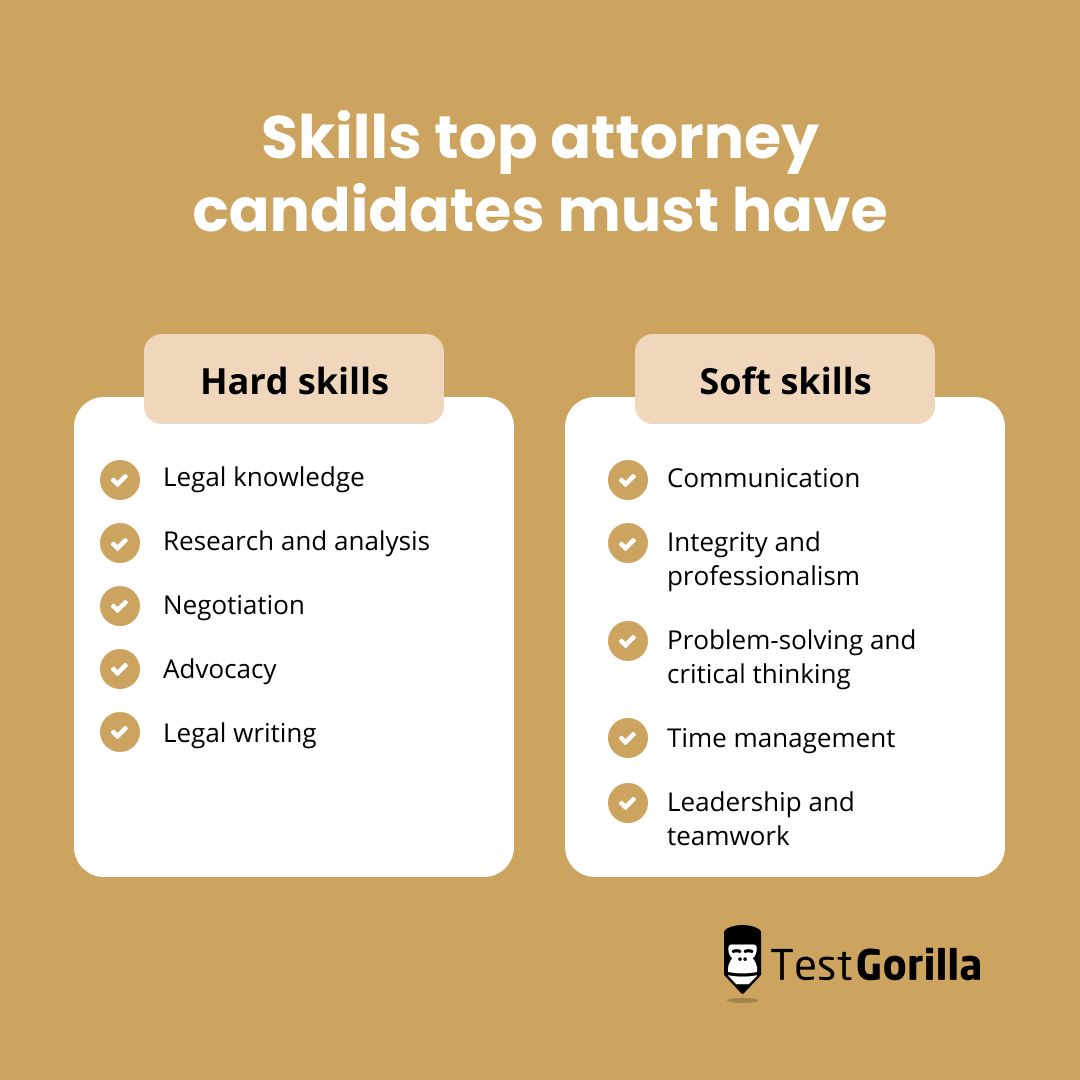In a world governed by laws and regulations, it can be difficult to navigate the legal landscape on your own. While popular movies and TV shows might make you feel like your small business can take on the system alone, it’s best to seek the assistance of an attorney for any legal issues.
For larger organizations, this is even more crucial: Millions of dollars might be at stake, not to mention your reputation before clients, partners, and current and future employees.
Legal matters can be complex and overwhelming, requiring the expertise of a skilled professional. Therefore, knowing how to hire an attorney is super important: The right person can turn the tide in your favor, even in difficult situations. So, hiring a skilled lawyer to defend your business’ interests can be the difference between winning or losing critical cases.
In this article, we’ll talk about some of the skills you should look for while hiring an attorney, such as strong negotiation skills and excellent business ethics, and explain how you can streamline the attorney recruitment process with the help of skills-based testing.
What is an attorney?
An attorney, also known as a lawyer, is a professional who is licensed and authorized to provide legal advice to clients, assist them with legal matters, and also represent them in court if required. Attorneys are essential in upholding the rule of law and providing access to justice for individuals and organizations.
The primary role of an attorney is to provide legal representation to their clients. They can be specialized in different areas of law such as corporate law, intellectual property, tax laws, criminal law, family law and more.
Attorneys can be responsible for a wide range of tasks, including giving legal advice, creating legal documentation, conducting research, negotiating disputes and settlements, updating clients with case progress, avoiding conflicts of interest, and keeping the best interests of clients in mind.
Attorney hard skills
If you want to hire an attorney, especially for a full-time role, you need to know what skills to look for. Let’s first look at the hard skills that an attorney must have to defend your case successfully.
Legal knowledge
That one is kind of obvious. Every attorney must possess deep legal knowledge, including statutes, regulations, and legal precedents relevant to their area of expertise and the country in which they practice law.
Your lawyer should not just be able to quote cases or precedents from different books; they should have a comprehensive grasp of the legal framework and stay updated on any developments or changes that might impact your claim.
Hire an attorney who knows specific laws, can interpret complex legal documents for the case, and can represent you in court if needed.
Research and analysis
Legal knowledge isn't always sufficient. Attorneys usually have to conduct extensive research to build a solid foundation for each case.
They must be skilled at finding evidence, identifying precedents, analyzing legal materials, locating relevant resources and articles that'll benefit their case.
Negotiation
Negotiation is a crucial skill that helps attorneys secure favorable settlements for their clients. While it's not always necessary, attorneys often negotiate to resolve legal matters outside of court.
Effective negotiation skills rely on strong communication and the ability to assess the risks and benefits of the other side’s offer. They must be able to analyze the strengths and weaknesses of your position to reach a mutually beneficial agreement for both parties involved.
Advocacy
While many cases might be settled out of court, a few inevitably go to trial. In such cases, you need an attorney to advocate and represent the case before judges, juries, or arbitrators.
Strong advocacy skills, including the ability to construct persuasive arguments, anticipate opposing arguments, cross-examine witnesses and present evidence enable attorneys to make a compelling case.
Legal writing
Attorneys must regularly draft legal documents such as motions, pleadings, contracts, and legal opinions. Every document needs to be written with extreme precision and clarity; hence, legal writing is a necessary skill for all attorneys.
They should be able to translate complex legal concepts understandably and write them in a well-structured, persuasive format that complies with legal standards.
The best insights on HR and recruitment, delivered to your inbox.
Biweekly updates. No spam. Unsubscribe any time.
Attorney soft skills
Your hiring process shouldn’t be focused on assessing only hard skills and legal knowledge – attorneys also need strong soft skills to be successful, such as communication, integrity, and critical thinking.
Communication
Effective communication is one of the most essential skills for an attorney. They need to convey complex legal concepts to clients and juries while using strong advocacy and persuasion skills with judges and other parties involved.
Effective communication is also necessary when discussing or negotiating alternate dispute-resolution options.
Integrity and professionalism
Integrity and professionalism are among the most important traits of a lawyer. They should adhere to the highest ethical standards, maintain attorney-client confidentiality, and always act in your best interest. An attorney who demonstrates strong integrity will gain the trust of clients, colleagues, and the legal community.
Attorneys are also subject to reviews from the bar council; any doubt about their integrity or professionalism can harm their career. They must exhibit strong ethical judgment for making difficult decisions in challenging situations.
Problem-solving and critical thinking
Attorneys often encounter cases that aren't open-and-shut and require innovative problem-solving and critical-thinking skills. They need to look at issues from different angles, find answers, identify potential solutions, and evaluate their pros and cons, almost like a detective.
They must think creatively to develop comprehensive legal strategies and beat their counterparts. A successful lawyer anticipates potential challenges and adapts their approach accordingly.
Time management
Attorneys work on multiple cases simultaneously and not just on yours alone. They have demanding deadlines to meet for each of their cases, meaning that they must have strong time management and organizational skills.
They need to prioritize tasks, conduct investigations, pay special attention to official due dates, and ensure they’re able to cater to every client. Proper time management is necessary to ensure efficiency and productivity and get positive results for each case.
Hire an attorney who doesn't have too much on their plate and can dedicate themselves to working on your case personally.
Leadership and teamwork
Legal work isn't done alone. To win cases, attorneys must work with a team of paralegals, expert witnesses, and colleagues to help build a compelling defense. For this, they must have excellent teamwork and leadership skills to work effectively with others, contribute to group efforts, and leverage diverse types of expertise to achieve common goals.
How to test attorney skills
You can hire lawyers from the best law firms, contact your friends and relatives for their recommendations for trusted lawyers, or post an ad online. Whatever source you pick, it's vital to assess the abilities of every candidate before moving forward.
You need to know how to hire an attorney who’s best suited to your needs, or else you can end up losing the case. Attorneys have deep legal knowledge and hold much power in a court of law, so choosing the right attorney can make or break your case.
Instead of reviewing hundreds of resumes, you can streamline the attorney recruitment process. For this, you can ask candidates to take an assessment and shortlist them based on their performance.
Pre-employment skills testing is an excellent way to evaluate candidates. With TestGorilla, you can combine up to five tests in one assessment to get an overall view of their abilities. Some of the tests you can use are:
Communication: Lawyers must be excellent communicators to present a strong case to judges and juries, explain complex law terms and concepts to clients, and establish good relationships with partners and colleagues. Test their skills with this test.
Critical thinking: With this test, you can evaluate an attorney's ability to think on their feet and respond to court arguments or cross-examine witnesses on the spot.
Business ethics and compliance: Your lawyer should have a strong ethical compass, maintain confidentiality, and know how to recognize and avoid conflicts of interest, which you can assess with the help of this test.
Negotiation: Lawyers often need to negotiate cases to find the best solution for their client. This test will help you evaluate their abilities to negotiate the case in your favor.
Leadership and people management: Check how skilled your attorney is in leading their team and collaborating with other professionals to protect your interests.
How much does an attorney cost?
If your organization is looking to hire a full-time attorney, you’re probably already aware that lawyers are some of the highest-earning individuals. In fact, their average salary is therefore significantly higher than the average annual salary in the US.
The Bureau of Labor Statistics published the Occupational Outlook Handbook, which puts the average salary of a lawyer at $127,990, nearly three times more than the average annual salary in the US at $45,760.
It's important to note that the average salary of lawyers differs as per the state, the area of law they practice, and their overall experience. For instance, lawyers from high-paying states like California, New York, Massachusetts, and Connecticut tend to earn nearly double compared to the lowest-paying states of Montana, Mississippi, West Virginia, and Arkansas.
Along with these factors, the salary you offer will also depend on their reputation or success.
If you’re looking to hire an attorney for a specific case, their fees will also depend on those factors, as well as on whether they're working for a big firm or independently. Lawyers from big firms charge more than independent attorneys.
Attorney job description template
Below, you’ll find a sample job description template for hiring a full-time attorney for your organization. Feel free to copy and paste it, adapting it to your specific requirements.
If you’d like to hire an attorney for a specific case, we simply recommend that you contact a few lawyers in your area to discuss their availability and fees.
Job Title: Attorney
Location: [Company's City, State]
About Us:
[A brief introduction where you talk about your company, including information about your mission, values, and work culture.]
Job Summary:
[Your company name] is looking for an experienced attorney to join our dynamic team. This role involves understanding and interpreting laws and regulations, preparing legal documents, presenting facts in court, and defending our interests in legal proceedings. The ideal candidate should have a comprehensive knowledge of law and strong negotiation skills. Experience in [type of industry] is a major plus.
Key Responsibilities:
Draft and review various legal documents such as contracts, bylaws, non-disclosure agreements (NDAs), intellectual property agreements, and more
Represent the organization in court and before government agencies
Collect and present evidence to defend our interests in civil or criminal litigation
Conduct legal research and interpret laws, rulings, and regulations that concern our business
Negotiate agreements, contracts, partnerships, and settlements with other organizations and individuals
Ensure the legality of our commercial transactions and advise the organization on our legal rights and obligations
Qualifications and skills:
A law degree from an accredited law school
A current license to practice law in [your state]
A minimum of [number of years] years of experience as an attorney, preferably in [your industry]
Strong familiarity with [insert specific field of law if necessary, such as "corporate law," "criminal law," "intellectual property law," etc.]
Exceptional analytical and critical-thinking skills with a strong attention to detail
Excellent interpersonal, negotiation, and communication skills
Ability to manage multiple projects and deadlines simultaneously
Benefits:
[Information about the benefits your company provides]
How to apply:
[Describe your application procedure here; you can mention skills tests here if you plan to use them to screen applicants]
Attorney sample interview questions
With skills tests, you’ll be able to identify your top talent quickly and efficiently and filter unqualified candidates.
You can even add qualifying questions to tests, such as whether the candidate has a current license to practice law in your state; those questions help you save everyone’s time, yours and theirs.
Once you have a shortlist of your best candidates, it’s time to invite them to an interview to gain a deeper understanding of their skills and strengths.
Here are some sample questions you can use during the interview process:
Can you describe your experience in our industry?
How do you manage your time and prioritize tasks when working on multiple cases?
Can you give an example of a case where you successfully advised a client on a complex legal issue?
How do you ensure you stay updated on changes and developments in the state’s law?
Tell us about a case where you had to defend a position you didn't personally agree with. How did you handle it?
Can you describe your experience with negotiating settlements?
Can you share a case that you lost? What lessons did you learn from it?
How would you handle a situation where a client is upset or unhappy with the outcome of their case?
Can you give us an example of how you've dealt with an ethical dilemma in your legal career?
How do you explain complex legal matters to a non-legal audience?
You can also use behavioral interview questions to assess applicants’ ability to deal with specific situations in the workplace.
Hire the best attorney bias-free
According to the American Bar Association, there are more than 1.3 million lawyers in the US. With so many lawyers practicing in different areas, it can be hard to choose the best one, especially if you’ve never done this before.
To make your attorney hiring process easier and more streamlined, you can use TestGorilla's skills assessments, which are specifically tailored to evaluate the skills and abilities of your candidates objectively and bias-free.
You can use qualifying questions and combine up to five different skill tests from our test library to create a curated assessment for shortlisting the best applicants.
Start a free trial of TestGorilla today to streamline your hiring process and find the most skilled attorney for your organization, without bias or stress.
You've scrolled this far
Why not try TestGorilla for free, and see what happens when you put skills first.















